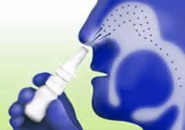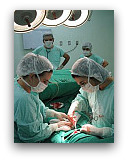Sinus Infection Treatment
"What to Expect from your Doctor"
Always consult your doctor before embarking on your own sinus infection home treatment.
Before shopping for remedies, be aware that the pharmaceutical giants have succeeded in getting FDA approval on several questionable OTC (over the counter) sinus medications.
An unacceptable number of these have dangerous, if not life-threatening side effects.
For example:

- Mixing decongestants with other drugs with similar side effects may cause life-threatening complications.
- Whereas decongestant nasal sprays prescribed by your physician bring quicker relief than the OTC variety, both types develop an unfortunate rebound effect known as "rhinitis medicamentosa."With excessive use, your body could develop drug resistance. If and when this happens, you will need more frequent applications to achieve the same clarity of breathing -- and if you try to stop using the spray, you could immediately become even more congested than before.This is drug dependence and not addiction in the true sense of the word, because you don't develop craving. Nevertheless, you would still require a difficult and expensive withdrawal program to wean yourself off the medication,
- If you have a history of cardiac disease or high blood pressure, taking OTC oral decongestants could be life threatening. Also, if you're a male patient and you happen to have an enlarged prostate, using them would make it virtually impossible for you to urinate.
- Even though Phenylpropanolamine has been withdrawn by the FDA because of its dangers, some OTC oral decongestants still contain this ingredient.
- If you have nasal polyps or suffer from frequent acid indigestion, taking nonsteroidal anti-inflammatory drugs: (NSAID’s), such as aspirin, Motrin, Advil and Alieve, could lead to accelerated polyp growth and/or more frequent acid reflux attacks (see the topic underacid reflux remedies). Rather use Tylenol to be on the safe side during your sinus infection treatment.
- OTC antihistamines cause more harm than good, because they dry out nasal cavities and solidify mucus deposits. This leads to further sinus blockage -- mucosal thickening causes layers of dry, flaky mucus to build up inside your nostril and clog nasal airways.
The following advice is worth repeating:
Do not attempt at-home sinus infection treatment by taking random OTC medication without your doctor’s approval.
Your doctor will offer advice on the most effective combination of OTC medications for you. S/he will also advise on correct dosages, together with the safest way to use nasal sprays and oral decongestants.
Alternatively, s/he can prescribe substitute medication that sidestep the above complications altogether.
<><><><><><><><><><><><><><><><><><><><><><><><><><>
Medical Sinus Infection Treatment
Your doctor’s first priority during sinus infection treatment is to eliminate infection.
Unfortunately if a cold virus causes it, there’s very little s/he can do, other than treat the symptoms and allow the disease to run its course.
Should this be the case, we strongly recommend taking 4 ounces ofMangosteen juice daily. Fresh juice or powdered mix of this Superfruit is an astonishingly effective sinus infection treatment, readily obtainable from the better health-food stores or directly from Amazon.com.
- If bacteria caused the infection, your doctor may use synthetic penicillin such as amoxicillin to fight the infection. However, if you are allergic to penicillin, s/he may resort to a sulfur-based antibiotic, which usually takes a little longer than artificial penicillin to become effective.Treatment with either of these antibiotics will typically last from fourteen to twenty-one days and should be supported by selectivehome remedies for sinus congestion.
- If there is poor response to the antibiotic regimen, your doctor may recommend a course of intranasal corticosteroids.These work well and they focus directly on the nose without affecting the rest of the body. However, they are expensive.
- If the sinus attack were caused by an allergy, s/he would probibably recommend a prescription antihistamine that doesn’t promote dryness while reducing inflammation of the mucous membranes.
- The core treatment for fungal sinusitis is anti fungal therapy and possibly surgery.
If your symptoms respond poorly to antibiotics and/or steroids, and your supporting home remedies have little effect, your doctor would probably refer you to an Ear, Nose and Throat (ENT) specialist.
This is a highly qualified physician specializing in rhinology (sinus infection treatment).
<><><><><><><><><><><><><><><><><><><><><><><><><><>
Balloon Sinuplasty Sinus Infection Treatment
If surgical treatment is called for, your ENT specialist may call for Balloon Sinuplasty under certain conditions; this is a safe, effective alternative to invasive surgery.
To facilitate sinus drainage, the surgeon inserts a small, flexible, balloon catheter into the blocked sinus passage. Once properly positioned, the balloon is inflated much the same way as heart surgeons open blocked arteries during angioplasty. This process shifts bone sideways and widens the passageway without causing trauma.
He then extends a flexible tube into the sinus cavity and delivers a metered dose of antibiotics to clear the infection.
The procedure does not require cutting or bone removal, and what’s more, the patient is able to return to his or her normal activities within a few days.
<><><><><><><><><><><><><><><><><><><><><><><><><><>
Do you Need Surgery?

Before attempting specialized sinus infection treatment, the ENT first identifies the root cause of the infection by performing one or more of the following:
- Nasopharyngoscopic examination.A nasopharyngoscope is a thin, flexible fiberoptic instrument used to examine the insides of the osteomeatal complex (OMC) – The OMC is the series of tubes connecting the nasal passage to the sinus cavities.
- CT scan or MRI examination.
- Lastly, s/he may drain a small amount of puss directly from the infected sinus. This is to identify the specific microorganism causing the problem, via pathological analysis.Puss drainage is an invasive test that is rarely used.
After a thorough investigation, the ENT would make certain recommendations.
A specialized course of antibiotics may be called for.
On the other hand, if the MRI or CT scans in conjunction with the nasopharyngoscopic examination revealed any of the following:
- Obstructive mucosal disease
- Fungus balls caused by fungal colonization
- Anatomical anomalies such as a deviated nasal septum (crooked nasal passage)
- Growth of obstructive nasal polyps
S/he would probably recommend non-invasive Functional Endoscopic Sinus Surgery (FESS).
During surgery, the ENT would carry out a sinus drainage procedure by opening the OMC. At the same time s/he would straighten the crooked septum if necessary, and remove any obstructive fungus balls and polyps to improve airflow through the nasal passages.
Patients usually respond favorably to endoscopic sinus surgery, however, chronic sufferers may require periodic antibiotics or the continued use of a corticosteroid spray.
If you wish to avoid using antibiotics or steroids, try taking 2 to 4 ounces of Mangosteen juice daily instead of prescribed medication.
<><><><><><><><><><><><><><><><><><><><><><><><><><>
References
- Mayo Clinic - Nasal spray addiction: Is it real?
- Mayo Clinic - Acute sinusitis
- Web MD - An Overview of Sinusitis
- Balloon Sinuplasty - Sinus Surgery with Balloon Sinuplasty™
- American Family Physician - Functional Endoscopic Sinus Surgery
<><><><><><><><><><><><><><><><><><><><><><><><><><>
P.S. If you like our site, a small donation (even $5) would help.
PayPal - The safer, easier way to donate!
PayPal - The safer, easier way to donate!
<><><><><><><><><><><><><><><><><><><><><><><><><><>
Back to Home Remedy Site home page, from Sinus Infection Treatment
<><><><><><><><><><><><><><><><><><><><><><><><><><>



